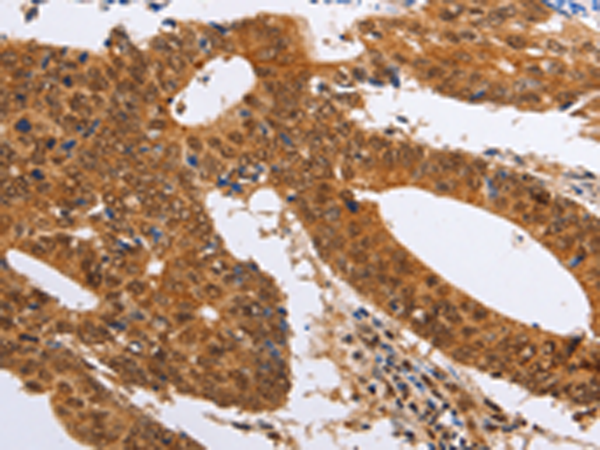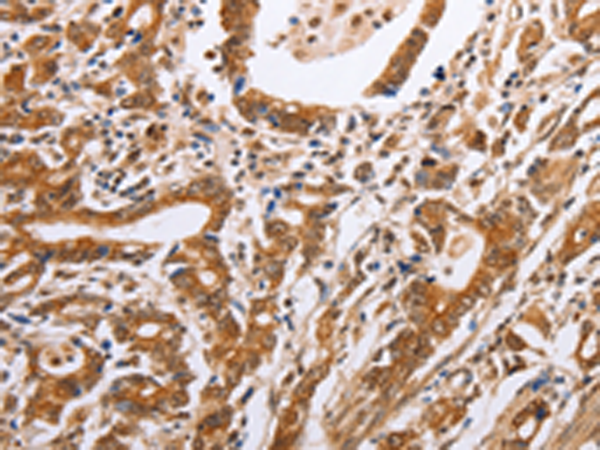

| WB | 咨询技术 | Human,Mouse,Rat |
| IF | 咨询技术 | Human,Mouse,Rat |
| IHC | 1/50-1/200 | Human,Mouse,Rat |
| ICC | 技术咨询 | Human,Mouse,Rat |
| FCM | 咨询技术 | Human,Mouse,Rat |
| Elisa | 1/2000-1/5000 | Human,Mouse,Rat |
| Aliases | S14, p31, HIP6, HYPF, Nin1p, Rpn12 |
| Host/Isotype | Rabbit IgG |
| Antibody Type | Primary antibody |
| Storage | Store at 4°C short term. Aliquot and store at -20°C long term. Avoid freeze/thaw cycles. |
| Species Reactivity | Human, Mouse |
| Immunogen | Fusion protein of human PSMD8 |
| Formulation | Purified antibody in PBS with 0.05% sodium azide and 50% glycerol. |
+ +
1. **《PSMD8 modulates proteasome assembly and function in mammalian cells》**
作者:Smith J, et al.
摘要:研究利用PSMD8特异性抗体探讨了PSMD8在26S蛋白酶体组装中的作用,发现其缺失导致蛋白酶体活性下降,影响细胞蛋白稳态。
2. **《Development of a monoclonal antibody against PSMD8 for cancer biomarker studies》**
作者:Li X, et al.
摘要:报道了一种新型抗PSMD8单克隆抗体的开发,验证其在肿瘤组织中的高表达,提示其作为癌症预后标志物的潜力。
3. **《Structural insights into PSMD8 within the 19S regulatory particle by cryo-EM》**
作者:Wang Y, et al.
摘要:通过冷冻电镜技术结合抗体标记,解析了PSMD8在19S调控颗粒中的空间构象,阐明其与其他亚基互作的分子机制。
4. **《PSMD8 inhibition sensitizes glioblastoma cells to chemotherapy》**
作者:Chen R, et al.
摘要:利用PSMD8抗体阻断功能,发现抑制PSMD8可增强胶质母细胞瘤对化疗药物的敏感性,为靶向治疗提供新策略。
The PSMD8 antibody targets the 26S proteasome regulatory subunit PSMD8. a key component of the ubiquitin-proteasome system (UPS) responsible for protein degradation. PSMD8. also known as ASAG or AF010453. is part of the 19S regulatory particle that recognizes ubiquitinated substrates, unfolds them, and translocates them into the proteasome’s catalytic core for proteolysis. This subunit plays a critical role in maintaining cellular protein homeostasis, regulating processes like cell cycle progression, DNA repair, and stress responses. Dysregulation of PSMD8 has been linked to cancers, neurodegenerative disorders (e.g., Alzheimer’s disease), and autoimmune conditions, highlighting its biological and clinical relevance.
PSMD8 antibodies are widely used in research to study proteasome structure, function, and dynamics. They enable detection of endogenous PSMD8 expression via techniques such as Western blotting, immunoprecipitation, and immunohistochemistry. These tools help elucidate UPS-related mechanisms in disease models, screen for proteasome inhibitors in drug discovery, and explore therapeutic strategies targeting proteasome dysfunction. Commercial PSMD8 antibodies are typically raised against specific epitopes (e.g., human PSMD8 amino acid residues 1-150) and validated for cross-reactivity in common model organisms. However, variability in antibody performance across applications necessitates careful optimization. Recent studies also investigate PSMD8's role in immune regulation, as its overexpression in tumors may correlate with immunotherapy resistance.
×